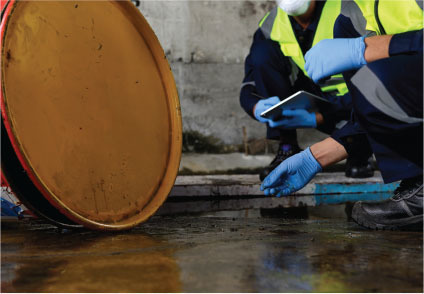December 2013
ON ETHICS: YOU BE THE JUDGE
Indecent Proposal?
A contractor’s suggestion to a local engineering office may—or may not—cross the line.
 The Situation
The Situation
Brocken Hardplace’s firm was hired by Clyint to provide engineering design services in connection with the design and construction of Clyint’s building. Part of the services Hardplace’s firm performs includes assistance when seeking construction bids from contractors. One of the steel fabrication contractors, an out-of-state company proposing to submit a construction bid, contacted one of Hardplace’s firm’s local engineering offices to determine whether the office would be interested in submitting a proposal to provide engineering review services in connection with the steel fabrication process.
What Do You Think?
Would it be ethical for the local engineering office to submit a proposal to provide engineering review services in connection with the steel fabrication process for the steel fabrication contractor?
What the Board of Ethical Review Said
Engineers are often called upon by various parties involved in the design and construction process to provide engineering services in a variety of capacities. These parties may include the project owner, other design professionals, contractors, subcontractors and suppliers, vendors, public agencies, and other parties. When called upon to provide these engineering services, engineers need to be mindful of a potential conflict of interest that could arise when attempting to serve more than one party on the project.
One of the most fundamental principles in the NSPE Code of Ethics is the concept that an individual engineer should not be in a position to perform a review of his/her own work for a client unless the circumstances are fully disclosed and agreed to by the client and/or other parties as appropriate. By serving as an owner’s representative, in most circumstances an engineer may be required to check a contractor or subcontractor’s work, including possibly the work of an engineer retained by the contractor or subcontractor. As the facts here suggest, this could require an engineer to review the work of another engineer. If the reviewed engineer is an employee within the reviewing engineer’s own firm, albeit in a separate, out-of-state office, this type of review could easily constitute an actual conflict of interest.
At a minimum, an engineer would have an obligation to bring this issue to the attention of all interested parties. However, even if all of the parties consent to the proposed review, the circumstance of an engineer reviewing the work of individuals within the engineer’s own firm, at a minimum, raises the appearance of a conflict of interest and also places the engineer in a potentially untenable situation, should some issue or disagreement arise between the client and the subcontractor.
As the expression goes, a party cannot serve two masters, and an engineer should not place himself in a situation where the engineer’s judgment will be called into question and could be compromised.
Conclusion
Under the circumstances, it would be unethical for the local engineering office to submit a proposal to provide engineering review services in connection with the steel fabrication process for the steel fabrication contractor.
NSPE Code References
Section I.5: Engineers, in the fulfillment of their professional duties, shall avoid deceptive acts.
Section II.4: Engineers shall act for each employer or client as faithful agents or trustees.
Section II.4.a: Engineers shall disclose all known or potential conflicts of interest that could influence or appear to influence their judgment or the quality of their services.
Section II.4.b: Engineers shall not accept compensation, financial or otherwise, from more than one party for services on the same project, or for services pertaining to the same project, unless the circumstances are fully disclosed and agreed to by all interested parties.
Section III.5: Engineers shall not be influenced in their professional duties by conflicting interests.
For more information, see BER Case No. 10-10.


 Volunteering at NSPE is a great opportunity to grow your professional network and connect with other leaders in the field.
Volunteering at NSPE is a great opportunity to grow your professional network and connect with other leaders in the field. The National Society of Professional Engineers (NSPE) encourages you to explore the resources to cast your vote on election day:
The National Society of Professional Engineers (NSPE) encourages you to explore the resources to cast your vote on election day:


